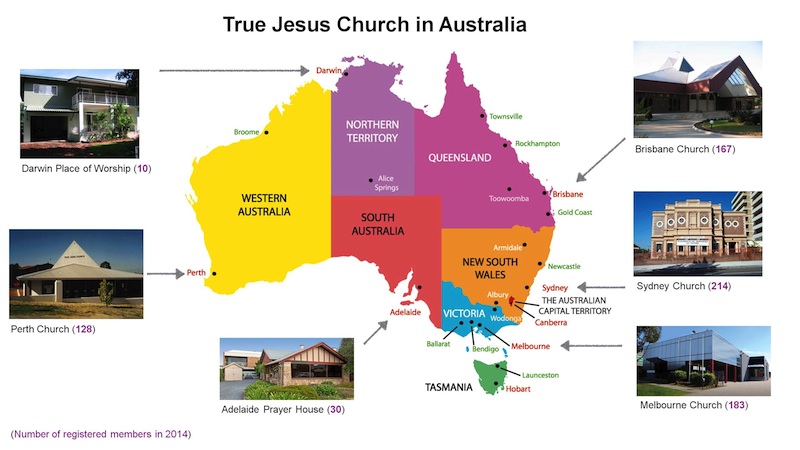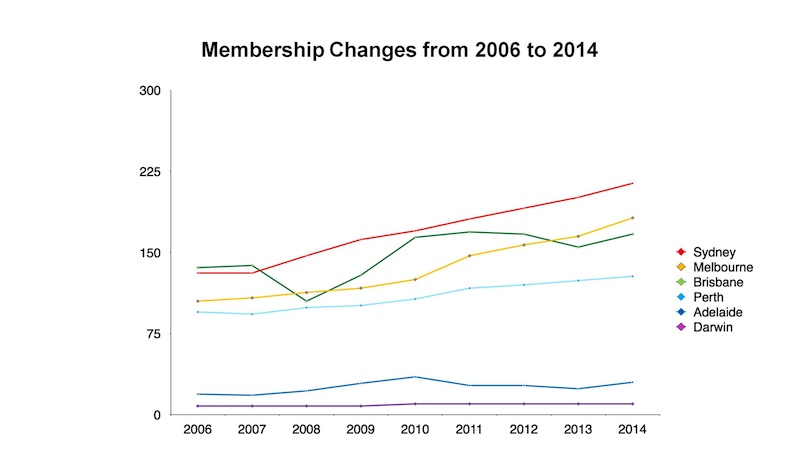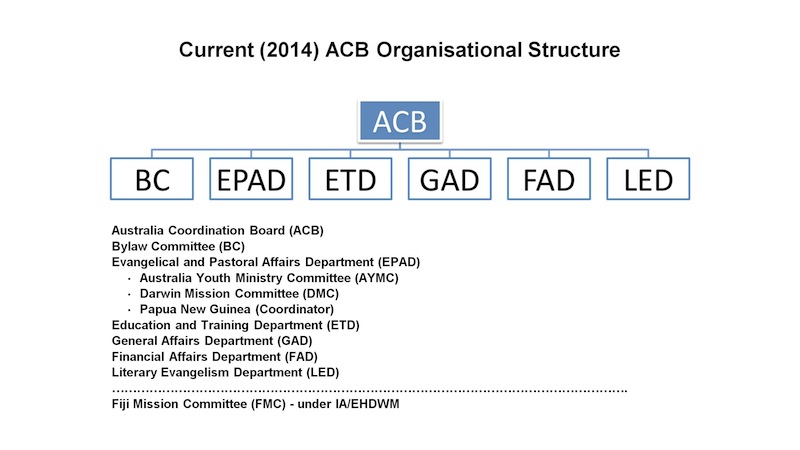Australia Coordination Board THE FIRST TRUE JESUS CHURCH MEMBERS IN AUSTRALIA 1980s In the early 1980s, True Jesus Church (TJC) members, primarily students and immigrants from various countries, started to gather in Melbourne and Sydney for family services on Sabbath days. Later, TJC members staying in Brisbane and Perth also began to gather for Sabbath services. In Melbourne and Sydney, overseas students and immigrants were predominantly from Malaysia, Singapore, Taiwan, Hong Kong, and Indonesia. Perth had a similar composition. In Brisbane, immigrants were mostly from Taiwan. By the mid 1980s, the Melbourne church and the Sydney church were established and registered as legal entities. Brisbane and Perth followed suit in the late 1980s. 1990s Over time, the congregation at the Australian churches grew, as more overseas members moved to Melbourne, Sydney, Perth, and Brisbane, and more truth-seekers (being immigrants or overseas students) were baptized. In the late1990s, the gospel reached Darwin. When relatives of Melbourne brethren residing in Darwin joined the true fold, a local place of worship was established. 2000s In the mid 2000s, some overseas students and immigrants moved to Adelaide. Family services soon started and the Adelaide House of Prayer was formally approved by the Australian National Church Conference in May 2014. 2010s As of December 31, 2014, the Australian churches have a total registered membership of 732. 
The churches in Melbourne, Perth, and Sydney currently have two church buildings (but not all of them are fully functional yet), and the Adelaide House of Prayer has purchased its own church premises in late 2014. The Australian churches have a multi-cultural congregation, from different backgrounds, including Australian Caucasians, locally born Australian children and youths, and immigrants from countries such as China, Taiwan, Hong Kong, Malaysia, Indonesia, Singapore, Korea, Vietnam, Timor, United Kingdom, and the United States of America. 
ESTABLISHMENT OF THE AUSTRALIAN COORDINATION BOARD (ACB) 1980s In the late 1980s, a proposal to form a coordination board incorporating churches in Australia and New Zealand was presented to the True Jesus Church in Auckland, New Zealand. At that time, the purpose was to organize and coordinate the visits of overseas ministers assisting the holy work in both countries. Subsequently, in 1990, the Australian New Zealand Coordination Board (ANZCB) was formed. 1990s The first Australian New Zealand Coordinating Committee (ANZCC) meeting was held on November 10, 1990 in Brisbane, Australia. Its first executive committee comprised Sydney church committee members, with Deaconess Priscilla Kong as the chairperson. However, on February 20, 1993, the churches in New Zealand opted out of the ANZCB. As a result, the ANZCB was dissolved and the Australian churches (Brisbane, Sydney, Melbourne, and Perth) then formed the True Jesus Church Australian Coordination Board (ACB) on April 9, 1993. On March 31, 1994, the ACB held its first ACB Delegates Conference (ACBDC) at Brisbane church. This was later followed by the first ACB Executive Committee meeting and the first National Church Conference. 2000s The ACB and the Australian churches are governed by the ACB by-laws, which are updated regularly. On October 5, 2009, the ACB became a legal entity as an Australian Public Company, Limited by Guarantee. The ACB Activities 1992 The ANZCB held its first Bible camp in Sydney in January 1992 with the assistance of ministers sent by the International Assembly/South East Asia Evangelical Centre. The camp’s main purpose was to promote fellowship among the youths from the Australian and New Zealand churches and at the same time, to provide spiritual nourishment. 1995 In January 1995, the ACB conducted its first Short-Term Theological Training Course (STTTC) in Melbourne. The purpose was to have a structured curriculum to nurture and train youths in their faith. The STTTC is a three-week course held annually, with the venue rotated among the Australian churches. Participants are students aged sixteen and above. 2004 The ACB introduced a one-week National Working Youth Seminar (NWYS), held concurrently with the STTTC. 2010 The ACB engaged Preacher Zephaniah Wei Sheng Li (on loan from Taiwan General Assembly) as the full-time resident preacher for Australia. Summary The ACB has established several mission committees to assist the holy work in local pioneering areas, such as Adelaide and Darwin as well as in other countries, such as Fiji. The ACB also assists in the holy work in Papua New Guinea. However, no mission committee has been formed so far—only the ACB resident preacher and another brother have been visiting local members in Papua New Guinea. The high crime rate in that country has hindered the dispatch of workers there. 
CHALLENGES AND RECENT DEVELOPMENTS - Full-time Ministry: The Australian youths have yet to respond to the call of full-time ministry, despite the extensive training provided by the church for them. The level of commitment and dedication required for a potential preacher is still absent.
Notwithstanding, the ACB continues to focus and emphasize on training Australian youths. This is accomplished through the annual Short-Term Theological Training Course (STTTC), which has a six-year syllabus, and the annual National Working Youths Seminar (NWYS). The STTTC and NWYS train, equip, and help youths to participate in church work at the local level. This includes sermon speaking, pastoral work, and evangelism. Suitable youths are also encouraged to participate in the Fiji missionary work. - Church Branching: To date, the Melbourne, Perth, and Sydney churches have purchased second church buildings and are in the process of branching out into two churches in their respective cities. Each local church has a succession plan to train as many youths as possible to enable them to step up and actively participate in the holy work. The increasing number of churches in Australia has also created more opportunities for every brethren to serve in their respective local churches.
- Married Youths: One specific group of youths who requires attention and encouragement are married youths. Married youths tend to shy off from church work once they have children. They should be encouraged not to stop their life of service after they marry. The church needs more zealous married youths to set good examples by continuing in their service to the Lord, even when they start a family.
- Marriage Counselling: Active national and international marriage facilitation is needed to ensure our youths marry within the Lord and to cater for the increasing number of youths of marriageable age.
- Care Groups: A significant percentage of the congregation in Sydney and Melbourne are from China. To earn a living, many of them need to work on Saturdays and are unable to attend Sabbath services. To pastor these brethren, the church has established dedicated care groups and conducts family services.
- Strong Pulpit Ministry: Australia is an affluent country and her citizens enjoy a good life. It is important to have strong pulpit ministry to remind our members not to focus on material enjoyment and possessions but to strive to nurture their spiritual life.
Although the Australian churches face various challenges, we thank the Lord for continuously adding souls to the true fold in Australia and for giving us the opportunity to care for the Lord’s sheep in other regions. May God continue to strengthen and guide the evangelistic and pastoral work on this continent. Amen.
| 

